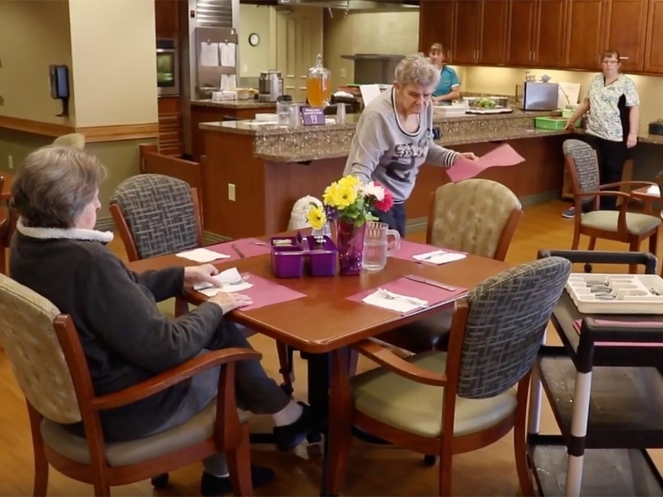
Dr. Maria Montessori wrote that “joy, feeling one's own value, being appreciated and loved by others, feeling useful and capable of production are all factors of enormous value for the human soul.”
Montessori is a philosophy of life that gives older adults the opportunity to grow, engage, love, and most importantly live. For the past year, Lutheran Senior Life, Passavant Community in Zelienople, Pennsylvania has been involved in bringing the Montessori philosophy to one of their personal care households. They received grant funding from the William Bingham Foundation in Cleveland and several other local foundations in Pittsburgh to involve Jennifer Brush to help them step by step through this culture change process, and Dr. Jeanette Benigas to conduct an unbiased program evaluation. The household was transformed through fresh paint, renovated activity areas, a refreshed sunroom for gardening, new wayfinding cues, and other redesigned spaced to help the elders of the household connect with long-term memories, reconnect with pleasant events, and therefore experience the positive associated emotions.
After staff was trained in the AMI Montessori for Dementia and Aging two-day program, they focused on identifying individual and small group activities and personalized roles that are available every day and that match the person’s cognitive abilities. Materials were neatly organized and labeled and physically accessible all throughout the household. Care partners practiced with elders to help them relearn previous roles or enjoy new ones. The more the elders did this, the more their skills improved until eventually they were able to do most or all of the activities on their own. Now elders clean and set the dining room tables, pour their own beverages, help themselves to drinks and snacks, care for plants, arrange flowers, fold laundry, make beds, dust, sweep, lead sing a longs, and pass out supplies for group activities. Some have begun to swim, reminisce with sports memorabilia, don jewelry and hats from a group fashion corner, craft, engage in topic specific puzzles and sorting activities, and play music with various instruments. Few elders can be found in their rooms as they are out during the day enjoying these activities. The television is located in the back of the household and is rarely utilized and napping during the day was naturally reduced as the result of more engaging activities available.
Activities and roles happen as a normal course of the day, just like they would if the elder was living at home. The result is a flow of the day during which people are doing different chores and hobbies on their own or in small groups. Elders are encouraged to choose materials freely and are able to respond to their own internal needs. Sometimes staff need to invite or remind elders to join an activity or to participate in a role; other times they initiate the activities themselves as a result of routine or carefully placed signage inviting them to enjoy the available activities (e.g. “please enjoy a snack” and “please pour yourself a drink”). Elders are encouraged to repeat activities and develop routines. This helps the elder know what to expect next and to be more independent.
Dr. Benigas and her research team of student volunteers from Clarion University engaged each elder individually before and observed them in their daily routines nine times in 15 minute blocks before and at the conclusion of Montessori implementation. Each elder participated in an oral reading ability and comprehension screening to determine if signage throughout the community would be helpful in supporting each individual. During the observations, the observers used the Observed Emotion Rating Scale to describe elders according to their facial affect and physical signs of positive and negative emotion. These emotions included pleasure, anger, anxiety/fear, sadness, and general alertness. The team also spent time conversing with and interviewing each elder using the Dementia Quality of Life Scale to find out how each person rated his or her life relative to living in the care community.
Reading ability and comprehension ranged from 86% to 100% and indicated that carefully placed signage could be used to invite the elders to participate in activities and assist them in finding their way around the household. The positive emotions, negative emotions, and general alertness observed during 15-minute observations at baseline and one year later were compared. A paired samples t-test for positive emotions determined that there was a statically significant improvement from baseline. Paired samples t-test for elder’s affect determined that there was a significant improvement across data collection sessions with 66% showing a positive affect during engagement prior to implementation of the Montessori philosophy and 86% showing a positive affect after living in a Montessori long term care household.
Other improvements included scores from the Dementia Quality of Life Scale. After living on a Montessori household, elders reported a 28% increase in positive feelings, most notably feeling more useful and more cheerful. Elders reported a 34% decrease in negative feelings, most notably feeling less worried, less sad, and less irritable. Observationally, the quality of activities after implementation of the Montessori philosophy appeared to be more engrossing. Rather than sleeping in their beds or chairs, or sitting unengaged in a room full of others doing the same, elders now share space participating in different activities, which creates a warm, inviting environment.
The Montessori philosophy reminds us to respect each person for the contributions one is able to make, encourage independence, provide meaningful work, and to remember that learning and engagement can occur anywhere. It is not a technique, task or intervention. It’s a way of living one’s life to the fullest extent possible.